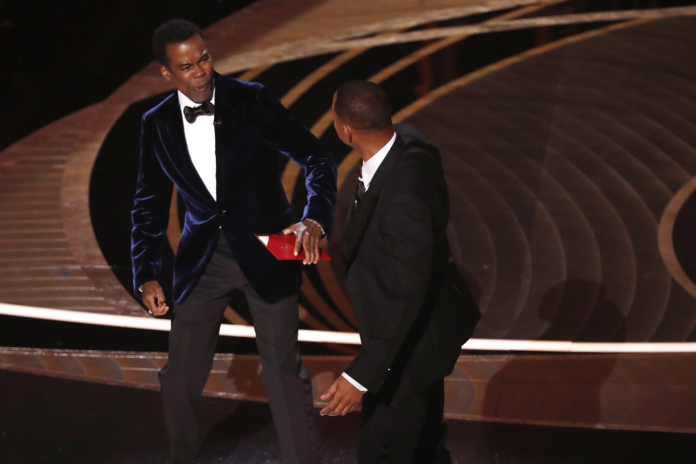![]()
There are two ways to recount what happened at the Oscars the night of March 27th, 2022:
- A man made an insensitive joke about another man’s wife while onstage, to which the other man responded in kind by smacking him in the face and putting him in his place.
- A man made an insensitive joke about another man’s wife while onstage, to which the other man responded in kind by assaulting him and then screaming profanities at him back in his seat.
If you were like me that night, you probably missed the fact that the Oscars were even happening. It was only while doom-scrolling on Twitter during my usual evening routine that I saw the 94th Academy Awards had begun. I rolled my eyes. For many Americans, the Oscars perfectly encapsulate what Hollywood has become: a distant, elitist, and mechanical institution, basking in self-flattery and totally disconnected from the audience it used to pride itself on serving. Oscars viewership has tanked, and winners are often irrelevant in our cultural consciousness—for reference, the virtually-unknown “CODA” won the once-coveted award for Best Picture this year.
This disdain made the Chris Rock-Will Smith incident somewhat amusing when it broke. Two celebrities in far-off Beverly Hills got into an altercation at a show no one cares about anymore. Admittedly, it was shocking and cringe-inducing—and by cringe, I mean the shivers one gets from seeing something truly awkward unfold. But I made nothing of it and promptly went to bed soon after.
It would be foolish to act like this isn’t just another Hollywood drama story that will plaster the tabloids for a week. It is.
It would be foolish to think this isn’t an attractive controversy almost tailor-made for Twitter, where every little incident is blown up into an earth-shattering event. It is.
It would be foolish to argue that most Americans, for whom the Oscars are the epitome of irrelevance, should spend more than a minute discussing what happened before moving on to something more interesting. They shouldn’t.
All this is to say that what transpired at the Oscars is trivial. The Sunday night incident at the Dolby Theatre will have few to no physical repercussions. It won’t ripple around the world, unlike the events in Ukraine, for example. Will Smith is merely the latest headline to have an opinion on.
There is, however, slight overlap between the war in Ukraine and Will Smith’s smackdown—both reveal moral fault lines within our society. We should be able to unanimously agree on what was right and what was wrong but cannot seem to do so. As tasteless as Chris Rock’s joke was, no comedic slight merits violence. Why is that?—some ask. The answer is the age-old axiom that “Sticks and stones may break my bones, but words will never hurt me.” The degree to which we’ve diverged from this should concern us all.
Comedy is entertainment, but it’s also commentary. A comedian cannot make good jokes by reciting mere facts—one doesn’t make people laugh by saying “the sky is blue” or “this stage is wooden.” Comedy at its most primitive involves simple observation, and we relate to it as a reaction to the trials of daily life. We joke to be flippant and let off steam, but the jokes we utter reflect serious ideas, attitudes, beliefs, and struggles. Comedy is the everyman’s way of casually expressing exasperation at the absurdities this world throws at us. As such, comedy is criticism of the most basic form, but veiled by a curtain of folly.
As harsh as they may be, the comedian’s verbal jests should be met with explicit criticism, disagreement, and jests in turn, but no more. And this principle applies just as much elsewhere as it does in a bar or comedy club. I can mention countless occasions where this principle, which is essential to free speech, is rejected. These have included college campuses, workplaces, and the public square. Comedy, however, used to be untouchable. Criticism in other, more polarizing forms may have fallen to the toxic creed that “hateful” speech equals violence. But humor was a final bastion where we agreed words shouldn’t receive physical retaliation. If they did, that act was surely criminal not just in the eyes of the law but in the eyes of the public, too.
The Will Smith incident is an inflection point. In the heat of the moment, Hollywood elites gasped in response to Smith’s actions but gave him a standing ovation when he won Best Actor just minutes later. During his speech, Smith made overtures to apologize but tried to justify himself as a “vessel for love” and his actions as stemming from protective urges. The same people, who should have been outraged at Smith’s assault, continued like nothing happened.
But the real story is the online reaction: tens of thousands of social media users, including several Congresspeople and local representatives, have defended Smith’s attack and repeated the line that words are violence and can be met with violence. It’s concerning that there is even a public debate on this issue trying to sketch the moral lines in what ought to be a simple example of wrongdoing.
To be clear, it’s a good thing that Will Smith apologized; that almost all of the aforementioned public figures deleted their tweets soon after; and that Americans are in agreement that what Smith did was wrong. Their account of what happened at the Oscars resembles the second story rather than the first one I mentioned at this article’s beginning.
But the moment we begin to waver on the basic principle that words are words, violence is violence, and there is a clear distinction between the two, is the moment when the moral bedrock of our society starts to crumble. This is far from a partisan issue; if we cannot condemn Smith’s actions with one voice, how can we imagine a society that will stand for freedoms it once cherished? And for all the aspersions we cast at the Oscars, the awards show is still supposed to represent the best among us—it is a showcase of American values and a mirror to our national image. If those in the spotlight can get away with assault, how easy will it be for those with less scrutiny to do so? For now, we may have passed this test of principle. For now, we seem to still value free speech and condemn wanton aggression. But whether we’ll pass these same tests in the future remains an open question.












